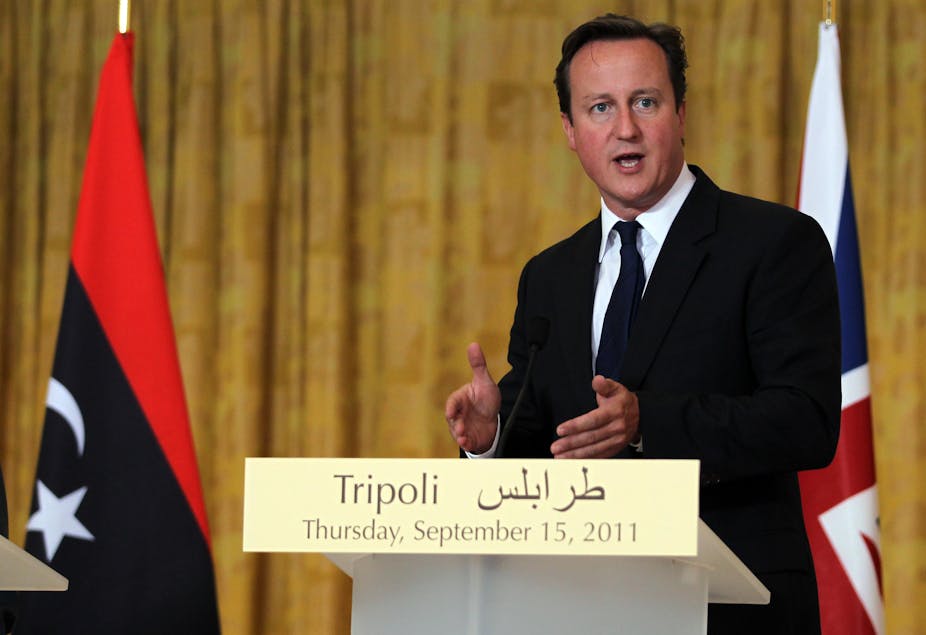After a summer recess, the House of Commons has returned with one fewer member: David Cameron announced that he was stepping down as MP for Whitney in Oxfordshire. Apparently, he wants to get on with writing his memoirs and undertake new challenges. But conveniently, it also means that he was not in Westminster to hear the damning conclusions of the Foreign Affairs Select Committee, which has released a report on the British government’s 2011 action in Libya.
The committee has found that the action “was not informed by accurate intelligence”, that the threat to civilians was overstated, and that the opposition to Gaddafi contained a “significant Islamist element”. It argues that the planning for a post-conflict Libya was flawed, that that failing has led the country to collapse – and that the blame lies with Cameron.
The report also finds that the UK government had been driven into action initially by France, whose then-president, Nicolas Sarkozy, was apparently keen to advance French national interests and bolster his own electoral prospects. The British government, it says, lacked detailed knowledge of the tribal context in Libya and overestimated Gaddafi’s abilities, leading them to conclude he was more dangerous than perhaps he actually was. The military action’s aims were apparently rather confused, with the initial civilian protection brief morphing gradually into a regime change mission.
Perhaps most damning, particularly given lessons that should have been drawn from the Iraq War, the report notes that the British government did not consider any other courses of action other than military force. The committee describes how diplomatic pressure and sanctions were simply discounted, with military action suddenly becoming an accepted policy.
Lessons never learnt
Perhaps the most mystifying element of this is how familiar it seems. The criticisms made by the Foreign Affairs Select Committee are strangely reminiscent of those made of Blair after the Iraq war. Again, the committee has been forced to tell a story of a British prime minister failing to plan for the stabilisation of a post-confict state, relying on bad or ill-advised intelligence, and ultimately helping to speed up the disintegration of an already unstable nation.
Indeed, the committee argues that President Obama was fairly accurate when he reportedly described the situation in Libya after the conflict as a “shit show”.
One of Cameron’s final tasks in the House of Commmons before handing over to Theresa May was to respond to the conclusions of the Chilcot Inquiry into the Iraq War. Chilcot argued, over many hundreds of pages, that Blair had over-relied on intelligence reports and failed to plan for a post-conflict nation.

In his response, Cameron noted that mistakes had been made in Iraq, but that the same mistakes had not been made in Libya: “I believe it was right to intervene to stop Gaddafi … we did have a United Nations Security Council resolution … we worked with a transitional Libyan government.”
The Foreign Affairs Select Committee clearly disagrees. How can it be that the lessons of Iraq have so quickly been forgotten? Perhaps they were just never learnt in the first place. Nor, it seems, were other lessons besides: the Blair government made foreign intervention in the name of human rights a key part of its foreign policy, but like many Western nations, it also tried to have its cake and eat it, loudly talking up pro-democracy causes in one-party states while supporting dictators who ensured stability and encouraged a pro-Western outlook.
The practical implications of this “pragmatism” meant some very difficult decisions had to be made – and unfortunately, a great many people on the ground paid with their lives.
What next, then, for Cameron? Perhaps he can leverage his international standing to personal advantage and/or humanitarian ends, as have Blair, Gordon Brown, David Miliband, and others. But like Blair before him, his legacy has been tarnished by foreign affairs, and as this report makes plain, Libya is perhaps the darkest stain.

